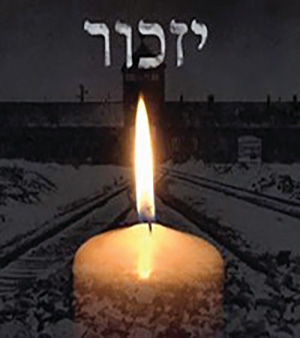


On Yom HaShoah, the Westchester Community gathered for a live virtual Holocaust memorial program, entitled “Testimony and Legacy, Marking 75 Years Since Liberation.”
YINR Rabbi Reuven Fink opened the event. “We’re living in very dark and difficult times. There’s much illness around us and much death. There’s great temptation to compare this pandemic to the Holocaust,” Fink cautioned. “I have read of these comparisons, made by very bright people, but even on a superficial analysis, one would find that these comparisons are ill-conceived and incorrect. The Holocaust is an unparalleled tragedy. It was the greatest crime of man against man in the history of the world. The Shoah is unique. It was exceptional in the specific precision with which it was carried out. It was unprecedented in the sheer scale on which it was conceived, to erase every single Jew from the face of the planet. The Shoah and its memory has been a defining experience of our lives for the past two generations. The population of survivors is dwindling, each passing year.”
He added, “Unfortunately, in the past few weeks, the coronavirus alone has taken so many survivors from us. We don’t know what will happen to Yom HaShoah as time marches on, but as long as we are blessed with our holy, precious survivors, Yom HaShoah is not merely a commemoration of the past, it’s an opportunity to honor and express our awe and reverence for the extraordinary survivors in our midst.”
The featured speaker, Dr. Moshe Avital, explained that he was assigned to the Buchenwald children’s barracks, with over 600 teenagers from almost every country in Europe, including Elie Wiesel and Naphtali Lau. Two weeks before liberation, Buchenwald held 80,000 prisoners. Only 20,000 remained alive after liberation. On April 7, 1945, orders were issued to annihilate all Buchenwald’s prisoners. Hundreds of Hitler Youth were to assist the SS in the effort, but the U.S. Army intercepted this train. Four days before liberation, camp leaders began to systematically empty the camp. Avital described prisoners who were forced to march into the forest and then shot to death. This massacre repeated itself for four days.
“Barrack by barrack was emptied, until our turn came, the children’s barrack,” Avital explained. “As we were marching to the gate we could hear the shooting coming from the forest. Dragging my feet, I felt that this was the end. I prayed to God, asking for justice and mercy by saying Psalm 121. We inched to the gate, praying for a miracle. At that moment, the sirens of the camp began to wail, the gate closed and the SS ran for cover. American fighter-bombers appeared in the sky and dropped bombs on the SS barracks. We ran back to our barracks.”
“At noon the next day, the Americans entered the camp,” he added. “Rabbi Herschel Schacter, an American chaplain, came into our barrack and announced in Yiddish, ‘Jewish children, you are now free!’ The day of liberation was the happiest and saddest day of my life. During the Holocaust, I felt strong in spirit. I had this iron will to survive. On the other hand, there were moments I felt hopeless and weak as a fly. On the 75th anniversary of the liberation of Buchenwald, we say to the souls of our people murdered in Europe we will never forget you. We will not stop [mourning] you. We will not let you down until we can walk without fear.”
Scarsdale’s Rabbi Jonathan Morgenstern spoke of his recently deceased grandmother. He read from her book about waking one morning in 1942 to find posters ordering Jews to the marketplace. Most showed up, but she hid with two siblings. From their hiding place, she saw her family being deported. Later, someone handed her a piece of her mother’s slip that had “hide and live” written in blood. At the next deportation, the siblings hid again. This time, her brother and sister were found and deported. Morgenstern revealed how he would watch his grandmother light Shabbat candles and cry. She explained that she was crying because every time she lit, she remembered her brother and sister, parents and aunts and uncles.
Vera Koppel, a survivor from Budapest, Hungary, concluded the program. “As a survivor I am often asked if I believe the Holocaust could ever happen again. My answer is no because of one very important difference in the world today. In 1939, we had no place to go. Since 1948 we have a place to go. We have a country of our own, Eretz Yisrael.”
By Judy Berger








